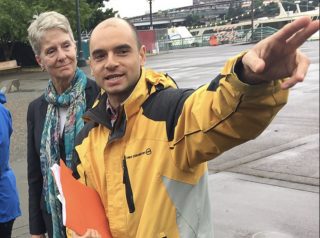
(Photos: Jonathan Maus/BikePortland)
Oregon Walks Executive Director Jess Thompson announced Wednesday morning she’s leaving to take a job as leader of a nonprofit in Hawaii. The move will further hasten the organization’s shift away from traditional walking advocacy and toward anti-racism work that centers racial and social justice.
Thompson was hired in October 2018 to lead Oregon Walks, a group founded in 1991 that was formerly known as the Willamette Pedestrian Coalition.
“It is a bittersweet transition,” Thompson said in her announcement, “because I have learned so much from each of you as we have engaged in the work to center walking as climate, health, transportation, and social justice solution.”
Oregon Walks shifted strongly toward a racial equity focus under Thompson’s tenure. But there transition away from lobbying for traditional infrastructure planning and projects began before she arrived. The group’s embrace of “social empowerment” and working directly with people who live and walk in neglected and under-invested neighobhoods started with former ED Steph Routh (who left in 2013) and continued under former ED Noel Mickelberry (who left in 2018).

Yesterday I spoke with Oregon Walks Board Member Timur Ender about the group’s shift toward racial justice work — and how current events have inspired the group to go even further in that direction.
Here are some highlights from our conversation (edited for clarity):
Can you explain how Oregon Walks’ mission has shifted and where you want to go with new leadership?
“The stress of a person who has exposure to gun violence has similar characteristics to someone who is exposed to traffic violence.”
I think now we’re at a position where we’re kind of excited to go even more intentionally into that racial justice space. It’s about being intentional about civil rights violations that occur in the public right-of-way. And even looking at all the factors that affect pedestrian safety including police violence, homelessness, and poverty. We’re not abandoning our mission of a walking focus, but it’s kind of a natural extension in the sense that these traffic crashes don’t happen in an abyss. The stress of a person who has exposure to gun violence has similar characteristics to someone who is exposed to traffic violence. And so it could be anything from police brutality to the disparate impact of jaywalking citations for example.
How do you respond to concerns that Oregon Walks is veering too far away from their core mission?
“If someone is rounded up in unmarked van while walking on the sidewalk in downtown Portland. They are a pedestrian. That is a pedestrian issue.”
We are laser-focused on pedestrian safety. Unfortunately, I think historically in the past pedestrian safety has been narrowly defined. And if someone is a pedestrian and they are more likely to be stopped, cited, detained searched shot killed because of the color of their skin; that is a pedestrian issue. If someone is rounded up in unmarked van while walking on the sidewalk in downtown Portland. They are a pedestrian. That is a pedestrian issue. If someone is walking and they are detained by ICE [Immigration and Customs Enforcement] agents, that is a pedestrian issue.
I think historically there’s been people who say, “I’m an avid pedestrian” and therefore someone walking to the corner store to get a coke isn’t. But when that person walking to the store ends up being run over by a white supremacist — he was an avid pedestrian too. So I think we need to question what “avid pedestrian” means, and usually it’s spoken from a position of privilege.
And what we are finding is that racism and pedestrian fatalities go hand-in-hand. Some neighborhoods have more resources than others. And when you have under-resourced neighborhoods, that’s where traffic crashes are concentrated because people’s needs are not met.
And so, I don’t see it as a shift in pedestrian safety, I think, moreso, it’s a understanding of the upstream factors, the root factors, the environmental factors that affect the pedestrian experience. Regardless of where your social, racial or financial status is in society.
But aren’t there other groups already focused on that type of work? And isn’t there an opportunity cost and capacity issues for Oregon Walks as you try to tackle issues related to race and don’t spend as much time doing things like combing through a pedestrian plan or tracking a sidewalk project?
I get your point. What I would say is we can’t afford to turn our back on how the most marginalized individuals in our society are experiencing the public right-of-way. We can’t turn our back on civil rights violations. And the issue is some neighborhoods are under-resourced and so when we focus on those who are more marginalized, everyone ends up doing better. And we can multitask. We have an army of volunteers, we have dedicated people focusing on plans projects. I’m not concerned about capacity. We simply can’t say we’re focused on ending traffic fatalities, without intentionally being focused on communities of color.
Advertisement
Does Oregon Walks support removing police officers from traffic-related enforcement?
We’ve continued to call for defunding police. When we put so much financial funding in the police, that is a direct threat to safe transportation infrastructure and safe investment in communities of color. Take jaywalking laws for example. I think most people on the [Oregon Walks] Board would agree jaywalking should not be a criminal citation. That should not be the reason an armed officer interacts with you. And if for some reason a crash does occur, the civil court system can help address that.
Ender then shared his concerns about an uptick in street crossing closures:
There’s an alarming trend with these closed crosswalks. Oregon Walks has always objected to these because they take away the rights of pedestrians but I think we focused on it for the wrong reasons. It’s not just that they take away the rights of pedestrians. They take away the legal rights of those who are most marginalized. We don’t live in an equal society, we live in mass inequality, we live in mass incarceration. And in a system of mass incarceration, that occurs by the slow, steady almost permanent erasure of legal rights.
And these “Crosswalk Closed” aren’t going to show up in inner southeast Portland. These show up on major arterials and most of those are in east Portland.
These are concerning to us, not because they take away the rights of pedestrians, but because they take away the rights of the most vulnerable pedestrians. And they’re a glaring example of failing to center the most marginalized residents in our society because if you were to go up to someone in east Portland, a Black pedestrian, and say, “How would you solve this traffic safety issue?” I can’t think of a marginalized individual who would say, “Take away my legal right to cross the street.”
Advertisement
Are there any parts of traffic enforcement that Oregon Walks things should be handled by police?
It’s fairly minor and should really be along the lines of of protecting individuals, not this warrior mentality. If for example City Council was to cut the Traffic Division, I would love to see a direct nexus of how those funds were used. For example, make it easier to physically narrow lanes and make street design elements that make it physically impossible for someone to go 60 mph on a city street. A focus on infrastructure is what other Vision Zero countries have done and if we do that we will take away some of the interaction between armed officers and the public.
What do you think about shifting more enforcement to automated traffic cameras?
That has to be approached with caution. It’s a nuanced and complex issue that requires understanding of over-surveillance of marginalized people, and the lack of fairness, around traffic citations in general.
For example we can’t have wide street designs and then, and then basically put in a camera and call it good. And in an ideal world, citations from a camera, would be income-based. That requires a change in state law in Salem, which is kind of something we’re interested in looking at as well. Not everyone has the ability to pay those fees, and if you can’t pay it does that mean, all of a sudden your liberty’s going to be taken away and you’re going to put into a jail cell? All of these things need to be addressed in the front-end and can’t just be afterthoughts, and we can’t just keep putting out more fixed speed safety cameras without at least acknowledging what we’re doing and how that impacts people.
For someone like you or I, paying a $200 fee might be nothing but for someone else it could basically spiral out of control where the next thing you know someone is trying to balance their liberty with putting food on the table.
——
Thompson will remain at Oregon Walks part-time until a new executive director is in place (likely by January). If you or someone you know would be a good fit to replace her, check out the job description here.
— Jonathan Maus: (503) 706-8804, @jonathan_maus on Twitter and jonathan@bikeportland.org
— Get our headlines delivered to your inbox.
— Support this independent community media outlet with a one-time contribution or monthly subscription.

